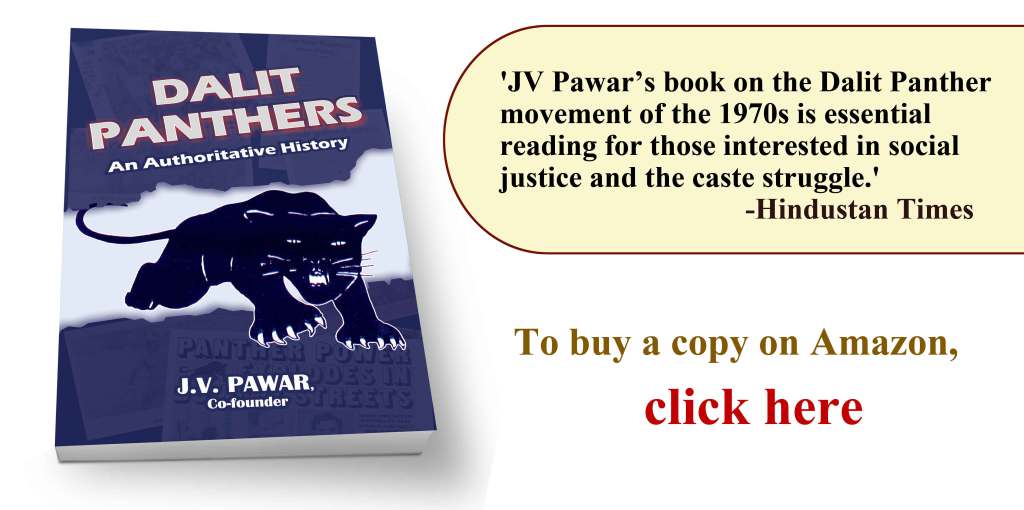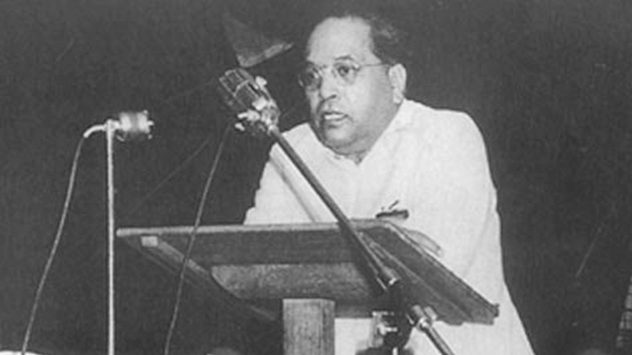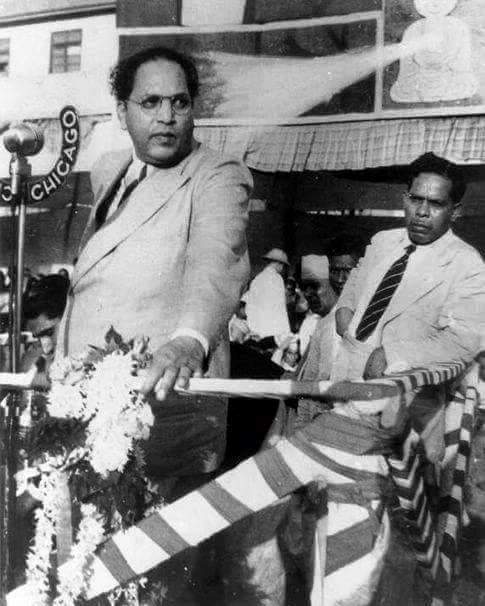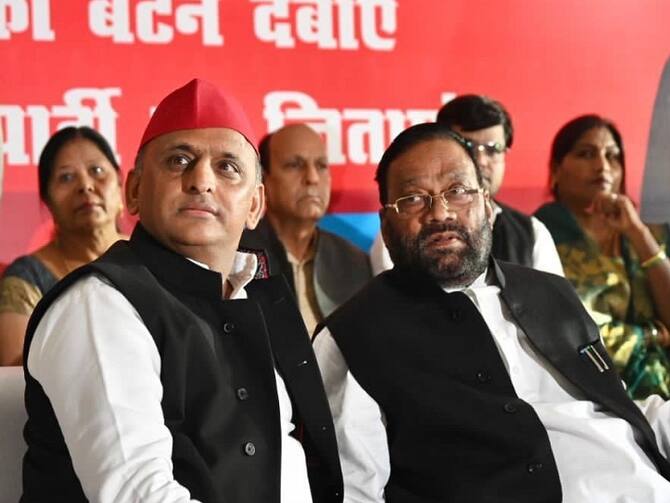Dr B.R. Ambedkar was knowledgeable about Constitutions adopted around the world and believed that the Constitution had a great role to play in a country’s progress. Underlining the role of the Constitution, he has written: “In other words all the social evils are based on religion. A Hindu man or woman, whatever he does, he does as a religious observance. A Hindu eats religiously, drinks religiously, bathes religiously, dresses religiously, is born religiously, is married religiously and is burned religiously. His acts are all pious acts. However evil they may be from a secular point of view, to him, they are not sinful because they are sanctioned and enjoined by his religion. If any one accuses a Hindu of Sin, his reply is, ‘If I sin, I am sinning religiously’.
 “Society is always conservative. It does not change unless it is compelled to and that too very slowly. When change begins, there is always a struggle between the old and the new, and the new is always in danger of being eliminated in the struggle for survival unless it is supported. The one sure way of carrying through a reform is to back it up by law. Without the help of legislation, there can never be any reform in any evil. The necessity of legislation is very great when the evil to be reformed is based on religion.”[1]
“Society is always conservative. It does not change unless it is compelled to and that too very slowly. When change begins, there is always a struggle between the old and the new, and the new is always in danger of being eliminated in the struggle for survival unless it is supported. The one sure way of carrying through a reform is to back it up by law. Without the help of legislation, there can never be any reform in any evil. The necessity of legislation is very great when the evil to be reformed is based on religion.”[1]

The excesses of Hindu society were utterly inhuman and these were slowly coming to an end under the pressure of the laws during the British colonial rule. But why were evils like discrimination against Dalits and untouchability still prevalent? Dr Ambedkar reasoned that some social evils were removed because the Hindus wanted to remove them – because these were evils within the Hindu family such as sati, and those pertaining to widow remarriage and women’s literacy. But untouchability is part of the structure of Hindu society which is considered right even today by the Hindus and therefore they do not want to end it.[2]
Dr Ambedkar felt that Hindus wouldn’t be able to do away with the caste system and despite laws against it, they would be obstacles for Dalits in the path of progress. Therefore, he tried to conceive provisions in the Constitution of independent India through which minorities would be able to easily secure their rights. India had become independent and a Constitution was to be written for independent India. He was worried because Brahmins dominated the Congress, which had gained the power to rule. He wrote: “India is now completely in the hands of the Hindus; they have full authority over it. Everything from top to bottom is in their control. There is no department where they are not in majority. Whether it is the police, courts or government services, in fact every sphere on governance is in their hands. As a result, the Untouchables are being crushed – between the Hindu citizens on one hand and Hindu-majority administration on the other. One commits atrocities against them, the other instead of helping them, protects and patronizes those who commit the atrocities.”[3]
Dr Ambedkar imagined a socialist model for the Constitution. He believed that without accepting a socialist model, it was not possible to improve the condition of the Untouchables in India, because social uplift was possible only if there was improvement in the economic status of a person. Economic progress was possible only through a system of state control and not through a system of privatization. He did not like the European model of social welfare in which the governments believed that most people did not need government handouts; only a few were poor who were in need of such welfare. The populist schemes of governments come under this model. This model isn’t of any good to the Dalits and although governments are adopting it, the condition of those in poverty has remained the same. This is a capitalist model. Dr Ambedkar believed that capitalism was an ideology of the rich and that socialism was necessary for the welfare of the poor and for industrial progress. On 17 December 1946, responding to a proposal of Pandit Nehru in the Constituent Assembly, he stated: “If this Resolution has a reality behind it and a sincerity, of which I have not the least doubt, coming as it does from the Mover of the Resolution [Pandit Jawaharlal Nehru], I should have expected some provision whereby it would have been possible for the State to make economic, social and political justice a reality and I should have from that point of view expected the Resolution to state in most explicit terms that in order that there may be social and economic justice in the country, that there would be nationalisation of industry and nationalisation of land, I do not understand how it could be possible for any future Government which believes in doing justice socially, economically and politically, unless its economy is a socialistic economy.”[4]
On 15 March 1947, Dr Ambedkar presented a memorandum to the Constituent Assembly on the implementation of socialist democracy through provisions in the Constitution.[5] In this memorandum he demanded that the Indian Constitution mandate nationalization of industry, agriculture, land and insurance, and collectivization of farming.[6]
The Congress realized that if Dr Ambedkar’s services were not used in the making of the Constitution, he might stir up a revolution that would be difficult to contain. Earlier, the Congress and Gandhi wanted to keep Dr Ambedkar away the Constituent Assembly and his well-wishers had to have him elected from Bengal. But when after the Partition, his seat in Bengal became null and void, Dr Rajendra Prasad wrote a letter on 30 June 1947 to B.G. Kher, the prime minister of Bombay, asking him to have Ambedkar elected from Bombay. Almost immediately, on 15 August 1947, Nehru appointed him the first law minister of independent India and chairman of the Drafting Committee of the Constitution. The Constituent Assembly had 296 members, who were part of various committees. The draft of the Constitution was passed after much debate and deliberation. Therefore, if the Dalit community believes that the present Constitution is entirely as Dr Ambedkar wished, they are wrong. If the Constitution was drafted as he had wished, then it would have laws for state socialism, like he proposed in his memorandum. But there is no provision for state socialism in the Constitution. On the contrary, as Dr Rajaram says: “By adding the right to property in the fundamental rights of the Indian Constitution, so that property is not divided and there is no check on it, the varna system has been preserved. These fundamental rights are in Articles 12 to 35. The right to property was placed firmly in Article 19 (f) and (g) and Article 31. Article 19 (f) and (g) give an individual the right to own property and use it in business, etc. No limit was placed on spending. Article 31 is an independent provision which gives the right to private ownership of property. The government can claim a property for public use from any individual but not without paying compensation. The fundamental rights were made sacrosanct and unchangeable so they cannot be tampered with. That is why Article 13 is a part of fundamental rights. Article 32 deals gives the right to approach a court in case of contravention of fundamental rights.”[7]

Did this happen with the consent of Dr Ambedkar? Is it possible that a person who has been advocating state socialism will make a law on private ownership of property? Absolutely not. He was not for making ownership of property a fundamental right. But the majority of the members of the Assembly had huge properties. They did not want to lose their property. They did not want socialism to get anywhere close to them. They did not allow nationalization of industry or land. There was no adult franchise then. Only the educated or those who owned property could vote. Among them were kings, nobles and landowners who could not be expected to support socialism. During the Constituent Assembly debates, only Dr Ambedkar spoke against compensation to landowners for acquisition of their land. He said that this was not his draft. According to him, when Article 31 was being written, the Congress was divided into three groups. Jawaharlal Nehru, Sardar Patel and G.B.Pant had major disagreements. The argument was resolved but by killing land reforms. Dr Ambedkar said that the Article was so ugly he “did not want to even look at it”.[8]
It wasn’t until the Constitution (42nd Amendment) 1976 was implemented that the word “socialist” was introduced into the Preamble. Two years later, the Constitution (44th Amendment Act) 1978 was implemented and the right to property ceased to be a fundamental right.
Dr Ambedkar did not believe that a capitalist parliamentary democracy was ideal. The Directive Principles of State Policy which are in Part IV of the Constitution are not as Dr Ambedkar would have liked them. These come under Articles 36 to 51. The Directive Principles guide the State in making welfare-oriented laws. However, Article 37 states that these directives are not enforceable in a court of law. It is therefore a toothless tiger. These principles are but a show of socialism and in reality mere capitalist ventures.
Hence, in his historic speech to the Constituent Assembly on 25 November 1949, Dr Ambedkar said that the real credit for preparing the draft of the Constitution should first go to B.N. Rao and then to the main draftsman, S.N. Mukherji.[9] This makes it evident that Dr Ambedkar did not write the Constitution all by himself; the Brahmins had a hand in its drafting and their interests were kept uppermost. Thus, in his speech, he says, “On the 26th of January 1950, we are going to enter into a life of contradictions. In politics we will have equality and in social and economic life we will have inequality. In politics we will be recognising the principle of one man one vote and one vote one value. In our social and economic life, we shall, by reason of our social and economic structure, continue to deny the principle of one man one value. How long shall we continue to live this life of contradictions? How long shall we continue to deny equality in our social and economic life? If we continue to deny it for long, we will do so only by putting our political democracy in peril. We must remove this contradiction at the earliest possible moment or else those who suffer from inequality will blow up the structure of political democracy which this Assembly has so laboriously built up.”[10]
In fact, Dr Ambedkar was not able to bring in his revolutionary state socialism in the Constitution. We know the political situation that came in the way. Dr Ambedkar did not have the support of the majority. The Bahujan community of the time was not literate or aware. But today, the community is educated and also aware. It would be a good thing if they were to now begin a movement to demand the inclusion of state socialism in the Constitution.
Translation: Maitreyee; copy-editing: Anil
[1] Dr Babasaheb Ambedkar: Writings and Speeches, Vol 12, 1993, ‘The Untouchables and the Pax Britannica’, p 115
[2] Dr Babasaheb Ambedkar: Writings and Speeches, Vol 1, 1980, ‘Annihilation of Caste’, p 41- 42.
[3] Dr B.R. Ambedkar, Rajya aur Alpasankhayak Dalit, trans Ramgopal Azad, Samta Prakashan, Samta Sainik Dal, Nagpur, 1998, pp 49-50.
[4] Dr Babasaheb Ambedkar: Writings and Speeches, Vol 13, 1994, p 9
[5] See Dr Babasaheb Ambedkar: Writings and Speeches, Vol 1
[6] Dr Babasaheb Ambedkar: Writings and Speeches, Vol 1, pp 396-397
[7] ‘Bharat mein Sanvidhik Arthvyavastha Banaam Bahujan Varg’ (pamphlet), Bahujan Vaam Shakti, Agra, pp 1-2.
[8] Dr Babasaheb Ambedkar: Writings and Speeches, Vol 15, p 948
[9] Dr Babasaheb Ambedkar: Writings and Speeches, Vol 13, pp 1208-1209
[10] Dr Babasaheb Ambedkar: Writings and Speeches, Vol 13, p 1216
Forward Press also publishes books on Bahujan issues. Forward Press Books sheds light on the widespread problems as well as the finer aspects of Bahujan (Dalit, OBC, Adivasi, Nomadic, Pasmanda) society, culture, literature and politics. Contact us for a list of FP Books’ titles and to order. Mobile: +917827427311, Email: info@forwardmagazine.in)
The titles from Forward Press Books are also available on Kindle and these e-books cost less than their print versions. Browse and buy:
The Case for Bahujan Literature
Dalit Panthers: An Authoritative History






